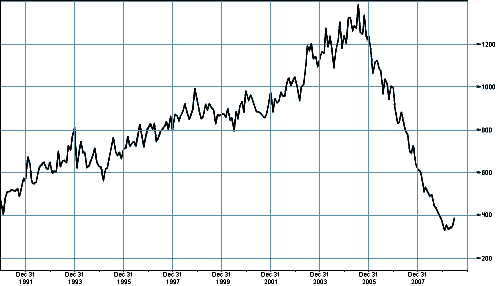Posted on Wednesday 12 August 2009
The House Judiciary Committee has just released all its materials from the Rove and Miers interviews. They are linked below…BTW, here’s what HJC sent out in the press release. Key new facts revealed in the materials released today include:
It has previously been known that New Mexico Republicans pressed for Iglesias to be removed because they did not like his decisions on vote fraud cases. New White House documents show that Rove and his office were involved in this effort no later than May 2005 (months earlier than previously known) – for example, in May and June 2005, Rove aide Scott Jennings sent emails to Tim Griffin (also in Rove’s office) asking “what else I can do to move this process forward” and stressing that “I would really like to move forward with getting rid of NM US ATTY.” In June 2005, Harriet Miers emailed that a “decision” had been made to replace Iglesias. At this time, DOJ gave Iglesias top rankings, so this decision was clearly not just the result of the White House following the Department’s lead as Rove and Miers have maintained.
An October 2006 email chain begun by Representative Heather Wilson criticized David Iglesias for not bringing politically useful public corruption prosecutions in the run up to the 2006 elections. Scott Jennings forwarded Wilson’s email to Karl Rove and complained that Iglesias had been “shy about doing his job on Madrid,” Wilson’s opponent in the 2006 Congressional race. Just weeks after this email, Iglesias’ name was placed on the final firing list.
Karl Rove phoned Harriet Miers during a visit to New Mexico in September 2006 – according to Miers’ testimony, Rove was “agitated” and told her that Iglesias was “a serious problem and he wanted something done about it.”
In October 2006, Senator Domenici stepped up his campaign to have Iglesias replaced. According to White House phone logs and emails, as well as Rove’s own testimony, Domenici spoke with President Bush’s Chief of Staff Josh Bolten about Iglesias on October 5, 2006, and during October 2006, Domenici or his staff spoke with Karl Rove at least 4 times.
Kansas City US Attorney Todd Graves was removed as part of a White House-brokered deal with US Senator Kit Bond. In exchange for the Administration firing Graves, Senator Bond agreed to lift his hold on an Arkansas judge nominated to the Eighth Circuit federal appeals court. A White House email stated that “Karl is fine” with the proposal.
When rumors of the FBI investigation of Rep. Rick Renzi surfaced in October, 2006, one of Rove’s subordinates contacted Harriet Miers, who called Deputy Attorney General McNulty seeking a possible statement that would have “vindicated” Renzi. Even though this was contrary to standard DOJ policy, such a statement was issued several days later.“I have provided a copy of the materials released today to special U.S. Attorney Nora Dannehy to assist in her effort to determine whether federal criminal charges are appropriate and to pursue any such charges,” said Conyers.
Miers Told House Panel of ‘Agitated’ Rove
Bush White House Counsel Said Adviser Called U.S. Attorney a ‘Serious Problem’
Washington Post
By Carrie Johnson
August 12, 2009The dismissal of U.S. Attorney David C. Iglesias of New Mexico in December 2006 followed extensive communication among lawyers and political aides in the White House who hashed over complaints about his work on public corruption cases against Democrats, according to newly released e-mails and transcripts of closed-door House testimony by former Bush counsel Harriet Miers and political chief Karl Rove.
A campaign to oust Iglesias intensified after state GOP officials and Republican members of the congressional delegation apparently concluded that he was not pursuing the cases against Democrats in a way that could help then-Rep. Heather A. Wilson [R] in a tight reelection race in New Mexico, according to interviews and Bush White House e-mails released Tuesday by congressional investigators. The documents place the genesis of Iglesias’s dismissal earlier than previously known.
The disclosures mark the end of a 2 1/2 -year investigation by the House Judiciary Committee, which sued to gain access to White House documents in a dispute that challenged the Bush administration’s claims of executive power. House Judiciary Chairman John M. Conyers Jr. [D-Mich] on Tuesday characterized the role of Bush White House figures in the firing of Iglesias and eight other U.S. attorneys as improper.
"Under the Bush regime, honest and well-performing U.S. attorneys were fired for petty patronage, political horse-trading, and, in the most egregious case of political abuse of the U.S. attorney corps – that of U.S. attorney Iglesias – because he refused to use his office to help Republicans win elections," Conyers said.
In a statement Tuesday, Rove asserted that he "never sought to influence the conduct of any prosecution" and did not decide which prosecutors were fired. He also accused Democrats of making "false accusations and partisan innuendoes"…
Harriet Miers’ Testimony:Q And tell us the best you can about what you recall what Mr. Rove had to say when he called?A My best recollection is that he was very agitated about the U.S. Attorney in New Mexico. I don’t know that I knew the gentleman’s name at that time.Q And what did he tell you about the U.S. Attorney in New Mexico?A That he was getting barraged by a lot of complaints about the U.S. Attorney and his not doing his job…Q Did Mr. Rove raise with you complaints about voter fraud prosecutions?A That’s my best recollection, that he did.Q And what did he say about that?A I don’t know what he said. I know it’s my impression that he talked about the complaints that the guy wouldn’t do his job. And I believe he mentioned voter fraud…


 U.S. military defense lawyers for accused 9/11 conspirator Ramzi bin al Shibh cannot learn what interrogation techniques CIA agents used on the Yemeni before he was moved to Guantánamo to be tried as a terrorist, an Army judge has ruled. Bin al Shibh, 37, is one of five men charged in a complex death penalty prosecution by military commission currently under review by the Obama administration. He allegedly helped organize the Hamburg, Germany, cell of the Sept. 11, 2001, hijackers before the suicide mission that killed 2,974 people in New York, the Pentagon and Pennsylvania.
U.S. military defense lawyers for accused 9/11 conspirator Ramzi bin al Shibh cannot learn what interrogation techniques CIA agents used on the Yemeni before he was moved to Guantánamo to be tried as a terrorist, an Army judge has ruled. Bin al Shibh, 37, is one of five men charged in a complex death penalty prosecution by military commission currently under review by the Obama administration. He allegedly helped organize the Hamburg, Germany, cell of the Sept. 11, 2001, hijackers before the suicide mission that killed 2,974 people in New York, the Pentagon and Pennsylvania. The counterculture of the 1960’s sits in our past waiting for an explanation, and it’s all over the Internet right now as we edge up on the 40th Anniversary of the Woodstock Concert. It’s odd to me. I don’t much relate to Woodstock as anything other than a large Rock Concert that came at the end of the 1960’s – a time when the nonviolent Civil Rights Movement and the opposition to the Viet Nam War gave way to a hedonic culture of Drugs, Sex, and Rock and Roll. It was a sad time to me. I guess it couldn’t be helped, but it gave the forces that it opposed a caricature to mock for the last 40 years without acknowledging their part in creating it.
The counterculture of the 1960’s sits in our past waiting for an explanation, and it’s all over the Internet right now as we edge up on the 40th Anniversary of the Woodstock Concert. It’s odd to me. I don’t much relate to Woodstock as anything other than a large Rock Concert that came at the end of the 1960’s – a time when the nonviolent Civil Rights Movement and the opposition to the Viet Nam War gave way to a hedonic culture of Drugs, Sex, and Rock and Roll. It was a sad time to me. I guess it couldn’t be helped, but it gave the forces that it opposed a caricature to mock for the last 40 years without acknowledging their part in creating it. As the economic indicators begin to improve, and the Stimulus package begins to be actually felt in our communities, we’ll be entering a new phase in our political and economic life. What we’ve seen in the aftermath of the Bush Administration is the emergence of a new kind of leadership for the large segment of our populace that self identifies as "the Right" or "Conservatives." I would call it the Irresponsible Right, though the term is filled with my own bias. It seems as if the Mantra of the group has made a substantial shift in the few months since Obama’s Inauguration.
As the economic indicators begin to improve, and the Stimulus package begins to be actually felt in our communities, we’ll be entering a new phase in our political and economic life. What we’ve seen in the aftermath of the Bush Administration is the emergence of a new kind of leadership for the large segment of our populace that self identifies as "the Right" or "Conservatives." I would call it the Irresponsible Right, though the term is filled with my own bias. It seems as if the Mantra of the group has made a substantial shift in the few months since Obama’s Inauguration.



